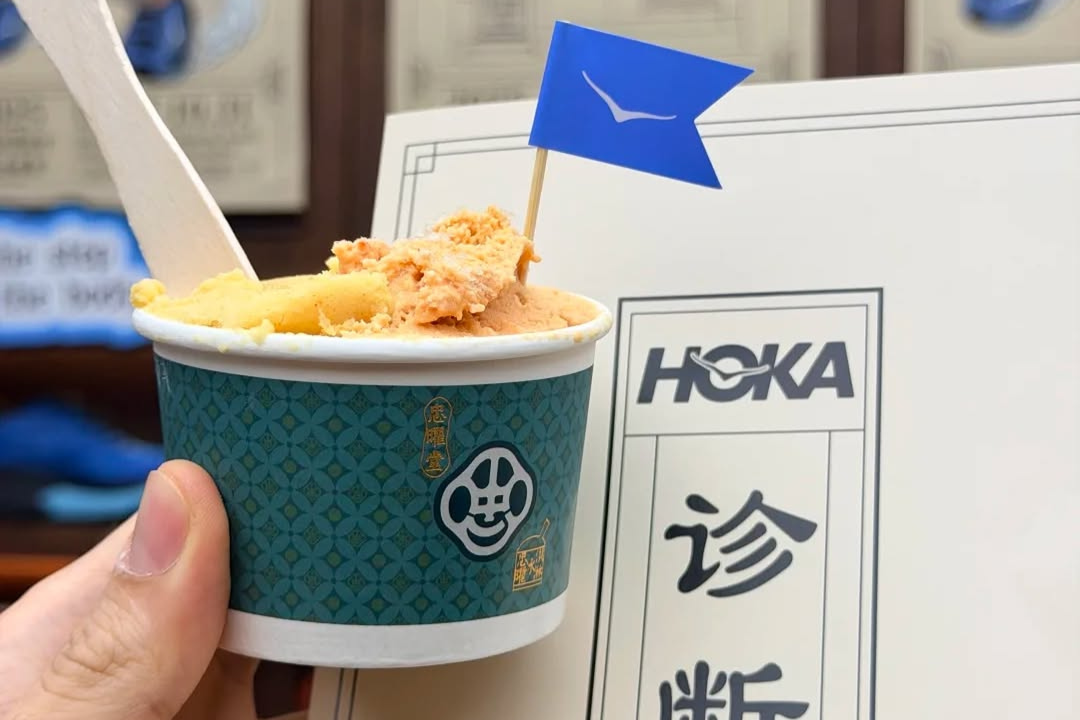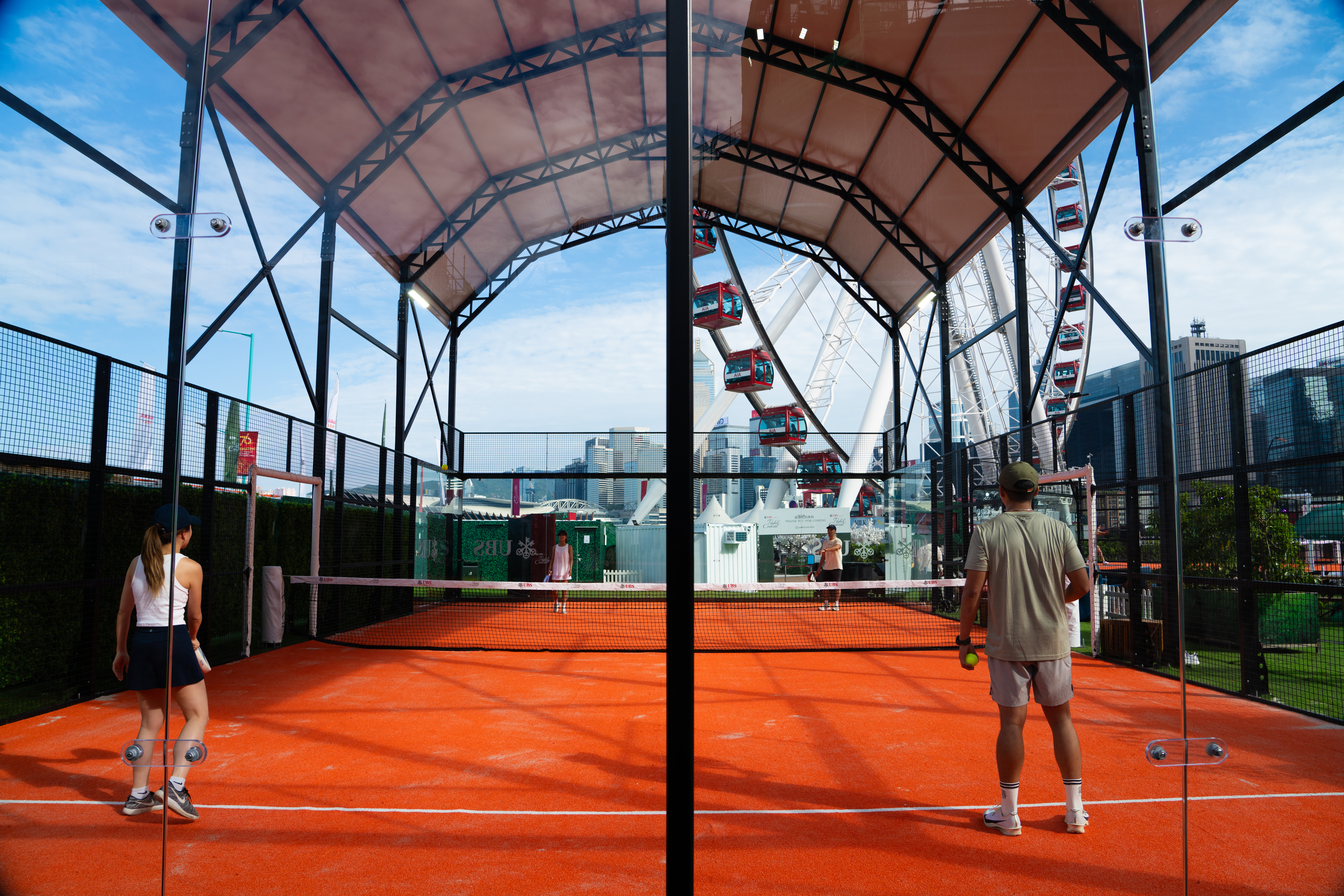It’s a crisp, refreshing morning in Beijing. Four days have passed since Lichun, a period signaling the beginning of spring in the traditional Chinese calendar year, but winter, it seems, is still in the air.
Nonetheless, it feels like the perfect day for the park.
I venture to Yu Yuantan Park in the western part of the city, and unsurprisingly it is filled with groups of elderly folks. While the city’s youth shake their hips at the club, this is the energetic haven for Beijing’s older residents.
Some jump over the fence to catch volleyballs, others run laps around the park, and I spot several grandpas executing complicated aerobic moves on the gym equipment. But none are as adventurous as the folks by the water.
Following the sound of what seems to be “Moscow Nights,” a popular Soviet-era Russian song, I wander towards the park’s south gate to see four retired men playing saxophone by the river. All topless.
They are the first set of winter swimmers I encounter here, apparently taking a break from their morning session.
“Our total age exceeds 300 years old,” one of the men tells me. They are an experienced bunch, with a history of winter swimming that goes back 20 years. The oldest says he is 95 years old.

A man dives into the frigid, partially frozen waters of Yu Yuantan Park
The water is about 2 meters deep and 5 degrees Celsius, warm enough for a quick dip. Some say the water temperature in degrees correlates to how many minutes one can stay in the water. A couple-minute dip in the freezing river is said to provide their essential daily energy boost.
I think to myself, here is a group of people who would love the ice bucket challenge.
A 75-year-old man dresses down to his swimsuit and, with goggles on, slowly walks deep into the canal. With his whole body in, he takes a couple of strokes, creating ripples across the surface of the icy water.
A rainbow of light surrounds the canal as if to bless the man as he swims. He emerges from the water looking refreshed, then washes up with a large bottle of water and puts on some lotion to prevent his skin from cracking, thus completing the waterside ritual.

This body of water is a part of the 110-kilometer-long Jingmi water diversion channel, which supplies a large amount of water for the city
As I watch, I think of the Chinese phrase ‘ren jie di ling‘ (人杰地灵), which literally translates to ‘rich lands foster human spirit.’ Blessed by the water and natural surroundings, the elders speak eloquently — their spirit is evident, and there seems to be energy flowing around them.

Winter swimmers lounging by the canal
This swimming tradition predates Mao and is heavily influenced by Russian culture. In 1966, then-73-year-old Chairman Mao took a dip in the Yangtze River near Wuhan as a political comeback statement to demonstrate his power, setting the stage for the launch of the Cultural Revolution.
Winter swimming has since been associated with power, longevity, and health, especially for the generation who witnessed Mao’s physical declaration of prowess.

One swimmer says he has to exercise this way to be healthy because he can’t afford the expensive medical bills in China
Amid the Beijing 2022 Winter Olympics, I spoke to three elderly swimming aficionados at the park to learn more about their passion for the pastime, whether or not young people are joining in on the action, and how the Games have granted them more freedom than ever.
The Grandpa With a Cold Attitude
Winter swimming may seem like the type of exercise that requires a hearty dose of comradery, but the competitive spirit remains. And as the activity is still male-dominated, ego is often at play.
Even though it’s a weekday, many spectators gather to film and cheer on the swimmers. To provide the perfect shot, one 60-year-old man, who considers himself a relatively young member of the group, jumps in three times. When he leaves the water after the final jump, his hands are shaking uncontrollably.
“Cold water drains body heat up to four times faster than cold air,” says a fully dressed grandpa, surnamed Qu, who was resting after an earlier swim.
As the quiet observer, Qu offers a more rational view of the sport: “It’s not a nice and soothing activity — more like zi tao ku chi (自讨苦吃),” he says, meaning the swimmers are deliberately looking for an arduous undertaking.

Mr. Qu washes up after a dip
According to Qu, some brave youngsters are tempted to try their luck but end up almost drowning. “The guy was shaking so much when he got out [of the water], and sunbathed for a long time to recover,” he says, recalling one overzealous young swimmer.
When the body hits cold water, the shock can cause dramatic changes in breathing, heart rate, and blood pressure, resulting in an increased risk of drowning.
Mr. Qu began his winter swimming journey strategically: He started in the summer and continued swimming regularly as the temperature dropped with the changing seasons — preparing himself for the cold winter water.
“Your body needs adjustment to nature,” he explains.
But extreme temperatures aren’t the only adversity these swimmers face. Almost every elderly swimmer I encounter mentions pressures from Beijing’s Bureau of Water Resources. The activity is criticized because it is ‘too dangerous,’ ‘doesn’t look so nice,’ or ‘ruins the atmosphere in the park.’
As a young woman standing among older men with only Speedo-style triangle swimsuits on, I can understand where the complaints come from. It does get a bit uncomfortable.

The Spring Festival couplets pictured above read: Swim 3,000 miles as exercise, winter swimming lovers, live healthily until the age of 200
“Swimmers come from all kinds of jobs — mostly important titles,” Qu says proudly. He himself is a retired government official, and the rest of the group consists of retired professors, scientists, and researchers, among other distinguished professions.
They have been actively speaking out against regulators for more than a decade. But thanks to the increased promotion of winter sports and general high spirits in Beijing during the Winter Olympics, tension has decreased.
The Seven Fairies
“No, I refuse,” says a 75-year-old woman calmly, as the crowd asks her to take a jump. Instead, she takes her time, entering the water slowly.

A 75-year-old female swimmer crouches by the edge of a dock
It is rare to see female swimmers along the river here, but I hear of an all-female group called the Seven Fairies, which is made entirely of women over 70 years old.
They are rumored to begin their swimming routine with some lively singing and dancing.

The name ‘Seven Fairies’ pays tribute to the seven celestial sisters from Chinese mythology. Image via Xiaohongshu
“I am from the South, with a history of more than 30 years of swimming,” says soon-to-be 67-year-old Mrs. He upon our introduction. She is a music teacher, skilled at the piano and all sorts of instruments, and sees winter swimming as a celebration of life.

Mrs. He: “I encourage young boys to join this sport to build up a muscular body”
“Winter swimming has many benefits. It can strengthen the body mentally and physically, decreasing the chances of getting cold, depression, and anxiety,” she explains. “I encourage young boys to join this sport to build up a muscular body.”
The Chinese Forrest Gump
Xia Hua overhears one of my conversations and quickly opens up about his life story. He is 65 years old, with 33 years of winter swimming behind him, and he also claims to have set a world record in a high-altitude marathon running.
“I had this massive fear when I first started. I had to take cold showers for a week to be able to get into the icy river,” he says.
Winter swimming is an energy boost for Xia. He wakes up around 6 AM, and at 11 AM, he bikes for 50 minutes to get to the park. He then takes a quick dip in the water, does some sunbathing, and starts his daily 10- to 15-mile run.

Mr. Xia dreams about going back to the Yenisei River in Russia for a refreshing cold swim
Xia’s body is relatively thin, but he is quick and high-spirited when he talks. To demonstrate his not-so-athletic body, he bends his knees, and I immediately hear a crack.
“I’ve had this knee condition since I was 15,” he says, adding that he could barely walk then, but carried on with running a year later. Somehow, his leg muscles regained their strength.
“The doctor concluded I have to be walking or exercising constantly, otherwise I will lose all muscle power,” he says. Ever since, he’s called himself the Chinese version of Forrest Gump.
Winter swimming keeps a constant supply of adrenaline pumping through Xia’s veins.
“The sport is addictive for two reasons. First, your blood starts to flow better. Second, it creates dopamine in your brain and a good feeling, rewarding you for the next dip,” he says. “That’s why you will see some people get sick if they don’t swim for a week — that’s a sign of addiction.”

Winter swimmers at Yu Yuantan Park
“I wish to get across the message that people ought to go outside to exercise in nature,” he says, adding, “It saved my life.”
Mr. Xia lived abroad for a long time. He once worked as a dishwasher in Los Angeles and spent half of his life doing business in Russia.
His next goal is to return to the Siberian city of Krasnoyarsk for a good swim in the Yenisei River. “The water is so clear that I want to drink it sometimes. It would be good to swim in my second home,” he says.
Standing with Mr. Qu, he has a good chuckle before adding, “We are hoping to swim until 100 and onwards.”
Unless otherwise stated, all images courtesy of Ruonan Zheng. Cover image compiled by Rubie Chen

















